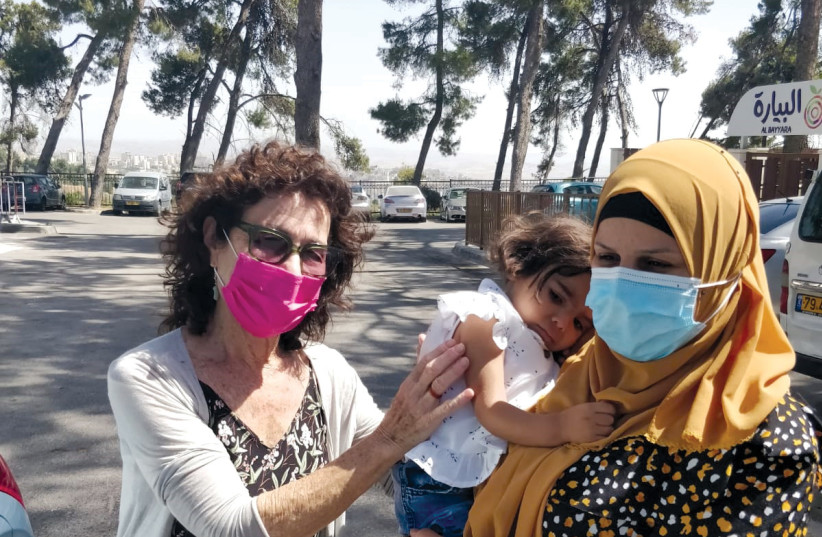For seven years, 11-year-old Mohammed Kisiya has frequently gone back and forth from the West Bank village of Dahariyya to Hadassah hospital in Jerusalem. Mohammed has a type of cancer called neuroblastoma, and it has now returned for the third time.
Today, Mohammed’s driver is Varda Edwards, who started volunteering with Humans Without Borders three years ago when she retired. She usually drives once a week, she said. In this case, she meets Mohammed and his father, Shadi, at the Bethlehem checkpoint just a few miles from her home.
Unlike some of the volunteers for Humans Without Borders, Edwards does not speak Arabic, which she said sometimes makes it difficult to communicate with her passengers. In this instance, Shadi, who has worked in construction in Israel for many years, speaks Hebrew well.
This time, the father and son will spend five days at Hadassah while Mohammed gets chemotherapy. Shadi will sleep in a chair next to his bed. During these stints, he said, Mohammed misses his mom’s cooking. Sometimes she comes to the hospital with Mohammed, but she puts limits on his screen time, so Mohammed prefers his father’s company.
At the hospital, nurses put a temporary port for the drugs into Mohammed’s chest. He winces as the needle goes in, and does not want to color or play with the toys that are in the children’s unit. Shadi tries unsuccessfully to cheer him up.

Shadi said he is grateful to Humans Without Borders for all their help over the past years, saying he knows he can call them for a ride at any time of the day or night.
“They are really good people, and I am so grateful. Jews, Muslims, Christians – we’re all just people.”
Shadi Kisiya
“They are really good people, and I am so grateful,” Shadi said, standing outside the entrance to the Ein Kerem hospital as he waved goodbye to Varda. “Jews, Muslims, Christians – we’re all just people.”
Helping Palestinians get medical treatment in Israel
The organization is run almost exclusively by volunteers except for a few paid taxi drivers when volunteer drivers are not available. This year they will make more than 5,000 unique trips per year, driving Palestinians to Israeli hospitals in Jerusalem and Tel Aviv, as well as to the Palestinian Augusta Victoria in east Jerusalem.
There are dozens of active volunteer drivers, and over time relationships form. Rabbi Dr. Meesh Hammer Kossoy volunteered every Friday morning for almost 10 years, driving three young children and their fathers.
“There is no doubt that I got much more from my weekly Friday morning drives than I gave,” she said. “Every week I was reminded anew of the sacredness of every human life and the blessings of health. The bonds I made with those families are everlasting.”
Kossoy said that she believes volunteering in one’s community is part of being an observant Jew.
“I consider regular community engagement a religious and human obligation no less important than giving a proportion of my income to those in need.”
Rabbi Dr. Meesh Hammer Kossoy
“I consider regular community engagement a religious and human obligation no less important than giving a proportion of my income to those in need,” she stated. “This simple act of kindness enables us to make small shifts in the way we see the world. I’ll never forget the time when I pulled into a checkpoint and scratched the car of the Arab in front of me. He was just about to start screaming at me when he saw what I was doing and just waved me away.”
The Palestinian Authority funds treatment for Palestinians in Israeli hospitals if it is not able to provide that treatment itself. But it does not pay transportation costs, meaning that families have to fund that themselves. A taxi is often unaffordable for many patients, and public transportation would take several hours and could endanger patients who already have compromised immune systems.
Amy Yourman, a volunteer coordinator for Humans Without Borders, said they are always looking for more volunteer drivers. She said that it offers an opportunity for Israelis and Palestinians to meet each other in a different way than Israelis and Palestinians usually interact. Many Israelis see Palestinians as potential attackers, and Palestinians see Israelis as settlers or soldiers.
“On the Palestinian side, they get a different picture of what Israelis are,” Yourman said. “I’m sure for a lot of the people, until they start riding with us they’ve only encountered Israelis as soldiers.”
The rides continued during the pandemic and continue now, despite a series of Palestinian attacks on Israelis and Israeli army incursions into the West Bank. But the drivers for Humans Without Borders say the violence only encourages them to keep driving. ■
